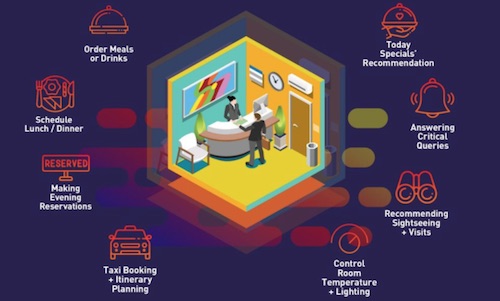
How cutting-edge hotels use artificial intelligence for a great guest experience
By cameron in Uncategorized
This is a viewpoint from Mitul Makadia, founder of Maruti Techlabs.
In the 21st century, industries that resist integrating new technologies often lose their competitive edge. Businesses across the globe have realized how important it is to include contemporary digital technology to drive constant growth and revenue.
The last decade has seen incredible innovations and breakthroughs in the landscape of digital solutions. One of such compelling technologies is Artificial Intelligence (AI).
Often misconceived as simply a replacement for human power, the concept of AI as a technological aid is more pervasive. For the hospitality industry, it has created greater trust and efficiency, showing the promise of transforming operations, customer service, and facilities through AI-powered robotics.
Let’s learn more about how hotel industry leverages Artificial Intelligence to improve the guest experience.
The idea of intelligent hotels
Having an intelligent hotel that surpasses customer expectations is the strategy many modern hospitality leaders and service partners conjure. What adds viability to this concept is the thought of making it all enhanced with AI-powered care, support and service. There are certain essential elements that make hotels intelligent.
Some of which are:
- Concierge robots
- Digital assistance
- Voice-activated services
- Travel experience enhancers
- Automatic data processing (machine learning)
AI robots not only diminish the human involvement with its voice-activated assistants but also smarten the way hotel guest service is delivered to customer’s satisfaction. From customer’s personal choices to their smallest of needs, AI-enabled hotel concierge bots can offer minute service and careful assistance.

Artificial intelligence covering many facets of the hotel experience
Artificial intelligence entering the hotel industry
Apple’s Siri started providing voice-activated assistance to its mobile users to an extent that it has become almost a norm now. Amazon Echo and Alexa have also joined the race of creating a richer, more delightful customer experience using the power of machine learning of AI software.
Ever since the artificially intelligent system has crept into the hotel industry, the hospitality sector is abuzz with AI’s ability to learn about customers using its data analytics platform that helps hotel staff create a better frame of customers. Utilizing the full potential of AI software, they can capture a gamut of information about:
- Customer Purchases
- Travel choices
- Journey patterns and itinerary
- Location preferences
- Hotel rating inquiries
- Payment methods
The knowledge gathered thus can further be translated into providing insightful experience to hotel guests as they travel, inquire, stay and enjoy the luxurious hotel amenities.
AI-powered concierge for responsive customer service
The hospitality industry has realized that in-depth customer service, paired with properly-harnessed customer insight, is the best key to increase brand value. This is why we have begun to see a rise in mature-service hotels where customers not only enjoy a hotel’s interior charm but are also equally satisfied with effective AI robot concierge services.
In last few years, we have managed to feel comfortable with voice assistants on the go as well as at home, bridging the gap between machine and humans. The hospitality industry now has the next generation of the hotel concierge.
Hilton goes all in with Connie
As an example, Hilton’s new AI-based concierge Connie is transforming the hotel’s guest experience. Connie is deemed as the first ever AI-enabled robot with two-feet of height. Performing just like a human concierge, Connie can assist arriving hotel guests at front desk standing on its bipedal support.
Connie has the following attributes for offering exquisite customer service:
- It relies on IBM’s Watson AI for computing intelligence
- Uses travel database WayBlazer
- Gives real-time recommendations for visit-worthy sites and attractions
- Answers customer queries on the spot
- Learns from frequent customer interactions to refine its responses
- Provides excellent care and support as a robotic concierge
- Exhaustive care with mobile apps
People love absolute control and flexibility and feel attracted to securing their comfort level at hotel premises.
How chatbots propel better customer service
AI-driven chatbots, like Hilton’s Connie, are a vital key to a mobile-first approach to customer service. Through virtual interactions via mobile app, chatbots can bypass hotel staff and be a service representative just like a human at the other end.
Hotel guests can use hotel’s special mobile device to interact with chatbots to perform all relevant tasks including:
- Ordering meals or drinks
- Suggesting special dishes
- Controlling room temperature and lighting
- Scheduling dinners/lunch
- Managing evening reservations
- Taxi booking and itinerary planning
- Recommending interesting sightseeing and visits
- Answering critical queries
A dedicated mobile app empowers customers’ stay, giving them the luxury to unlock their room, adjust room temperature, and operate curtains, order drinks and many other things using their smart mobile phone.
Intelligent travel companions
Travellers have evolved lately and desire a great mixture of high-grade personalization and exceptional serviced standards on the go. On the other hand, hotel operations are complicated by heavy amounts of data about visitors and hotel staff. This creates critical challenges related to ensuring a flawless customer experience. This is where intelligent travel phones can come to assist.
As soon as a guest enters their room, AI-enabled phones that offer amazing features such as:
- GPS capabilities
- Gamification and amusement
- AI-powered in-built hotel app
- Access to unlimited data and international calls
- Handy travel guide to city attractions
- Promotional offers
- Return travel booking services
- Quick access to hotel service assistantsRecently, Signature Lux Hotels in Gauteng has claimed to be the first one to furnish incredible guest experience through such digital travel companions that offer intelligent voice-activated apps.
Knowing your customer
In order to serve customers better and create superior guests experience, it is vital to first gather most knowledge about customers.
The more you know about your customer, the more you exceed their expectations. Knowing that having a window into customer’s life is of great importance, hotel over the past years have attempted to make their premise the best, a unique and most hospitable place for visitors and guests.
Even before arrival, customers begin to experience their services right when they book rooms through different online channels and check rates, room amenities, and comfort, availability, etc.
Today, from planning of journey online to check out point and return back home, everything is mulled over carefully by advanced machine learning system. AI does the real work of a dedicated chaperon helping with:
- Fast online assistance
- Personalized options and recommendations
- Saving user preferences and page visits
- Travel bookings and safe routes
- Advanced meal/drink preferences
- Room booking and reservations
Thanks to data-powered Artificial Intelligence, many things can be handled in advance and with little human intervention. Its information classification and management system that helps learn a great deal of customer’s behaviour. AI then uses the wealth of data to address individual needs and offer custom guest services.
Amazon’s Alexa for interactive experience
Amazon’s AI-based software service Alexa is visible across the world, in both Amazon and third-party products. It is a cloud-based service using which developers can use to deliver voice-enabled experiences.
Voice has become essential for customers who want an effortless and intuitive way to interact with everyday technology. And as Alexa becomes more conversational, the voice assistant has immense potential to change the future of hospitality industry with its powerful voice services.
With Alexa playing the central role in connecting hotels with guests, it becomes easy for users to make requests to hotel staff using only their voice as a major command. Via Amazon Echo, guests invest the minimal human effort to have their request delivered to hotel staff.
The following example of ordering meal illustrates the use of Alexa:
Alexa’s smart program stages the conversation perfectly and communicates the guest messages to the correct hotel staff member for order fulfilment. Guests save time and effort by placing their order without spending time typing the request on their mobile phone. Alexa is there to fetch information, take notes, and suggest pre-emptively. Hotel staff receives the precise order in the first attempt without even refining it, which ensures smoother, faster customer service.
This is how artificial intelligence of Alexa helps make everything easy and available by voice, creating a seamless, fluid and highly personalized guest experience with few barriers.

Mezi uses artificial intelligence
Hotels leveraging artificial intelligence
Increasingly, the hotel industry is testing AI around the globe. The wave of robotic butlers with cognitive capabilities is on the rise. Take a look at the following examples of the hotel embracing the benefits of AI:
Wynn Las Vegas
Las Vegas is a giant hub of opulent, posh world-class hotels that are known to offer exceptional luxury and customer experience. Recently, Wynn Las Vegas has made an announcement saying that it will integrate Amazon Echo to digitalize its 4,748 hotel rooms to offer their guests voice control over multiple facilities. At first, guests will be able to control room lighting, temperature, TV, and draperies. Eventually, the hotel will likely leverage Echo’s personal assistant services.
Clarion Hotel in Stockholm
Clarion Hotel Amaranten in Stockholm is one of the first hotels to use the AI-enabled chatbot butler, based on Amazon Echo. This assistant is equipped with power features and is designed to help guests with many of their requirements such as hailing cabs, ordering room service, online information and other hotel-related operations.
Cosmopolitan of Las Vegas
The Cosmopolitan has the AI-powered concierge named Rose. Its voice-activated assistant stands out from others, as it comes with a calling card that guests get upon checking in. It includes a phone number for guests to request anything they want via text, as well as making requests using voice. Rose manages queries precisely and also conveys unknown queries to hotel staff. Rose ushers you to entertainment options and local sites and hotel specialties.
Edwardian Hotels
Guests can utilize the hotel’s chatbot services to request assistance by typing the text message: “Edward”. Edward can guide guests to local restaurants, bars, famous spots and can also handle complaints. Upon failing to help guests with certain requests, hotel staff can chime in as a standby for Edward.
Henna na Hotel, Japan
Henna na Hotel is said to be the first ever hotel in Japan where robots serve hotel guests. Henna na has a humanoid female at the front desk and a dinosaur-personified robot to help arriving guests. Robotic porters carry your luggage to rooms and store it in private lockers. AI assistant Churi-chan serves in every room to help with adjusting room lights and providing information on weather.
Conclusion
Even though AI is regarded as the emerging technology trend, the hospitality industry has already experienced incredible benefits and wide impact on their business momentum. From AI-powered robotic concierge service to voice-activated assistants accelerate customer experience, Artificial Intelligence is changing the hotel industry.
The technology enables personalized concierge services, offers real-time recommendations, and easy service requests management. Hence, we can conclude that AI is working far beyond imagination for hotel systems, a breakthrough we all have been anxiously awaiting.
Related reading:
Invest in emerging technologies, but don’t forget about guest experience
Photo by Brian Kostiuk on Unsplash
![]()

